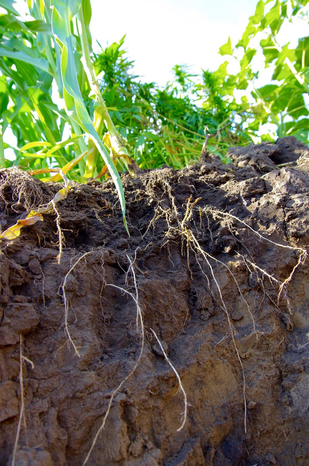|
by Lydia George
Fall is the time of year when you transition your garden from summer vegetables to more cold hardy varieties like kale, spinach, mustard, root vegetables and so on. But sometimes winter can also be a good time to restore the nutrients to your bed that were lost during the growing season to prepare for the coming year! This is where the idea of cover cropping your beds can really come in handy. Cover crops are hardy plant varieties that can cover your beds during the winter, and that will benefit the health of your soil during the time of year when it is hard to grow most vegetable varieties. There are many different kinds of cover crops to choose from, and many of them serve nutritional or medicinal purposes as well. One of my favorite cover crops is clover. Red clover and white clover are both in the legume family, meaning that they will restore nitrogen to the soil due to a symbiotic relationship with nitrogen producing bacteria that live in their root systems. Red clover is also a highly medicinal plant used for combating menstrual inflammation. Clovers are also native pollinators that bees love. There are other cover crops in the legume family that will restore the health to your garden beds, including hairy vetch and snow peas (winter hardy, delicious for you and wonderful for soil health.) You can also use turnips as a cover crop. Turnips will keep the soil covered during winter, and if you leave them to decompose then they will add rich nutrients to the soil for the future seasons, while also providing a winter food source. Mustard greens are also a vegetable that is often used for broad leaf cover cropping, and so is buckwheat. The benefit to broad leaf cover cropping is that the leaves will protect the soil and also take up space to keep less desirable weeds from growing in the garden bed. You can also turn broadleaf cover crops into the soil in early spring and let them decompose to add nutrients back into the bed. If you have soil in your garden that is very compact, planting grass cover crop varieties can help to break up the soil and make it more porous. Cover crops like oats and rye have deep root systems that are great for this purpose. But you have to make sure to take out or turn in the grassy cover crops before they go to seed, or you will find yourself with a lot of extra weeding to do over the next growing season. While there are many vegetable varieties you can grow over winter, planting your garden constantly with vegetables can exhaust the soil. Just like we need rest during the winter time, your garden does as well. Think of cover cropping as selfcare facemask you can give your garden to restore its health while it hibernates during the winter time. You can buy cover crop seeds in bulk at many garden and hardware stores including, SowTrue Seed, Fifth Season, Southern States, Lowes and Ace Hardware.
0 Comments
Leave a Reply. |
Archives
March 2024
Categories |


 RSS Feed
RSS Feed
